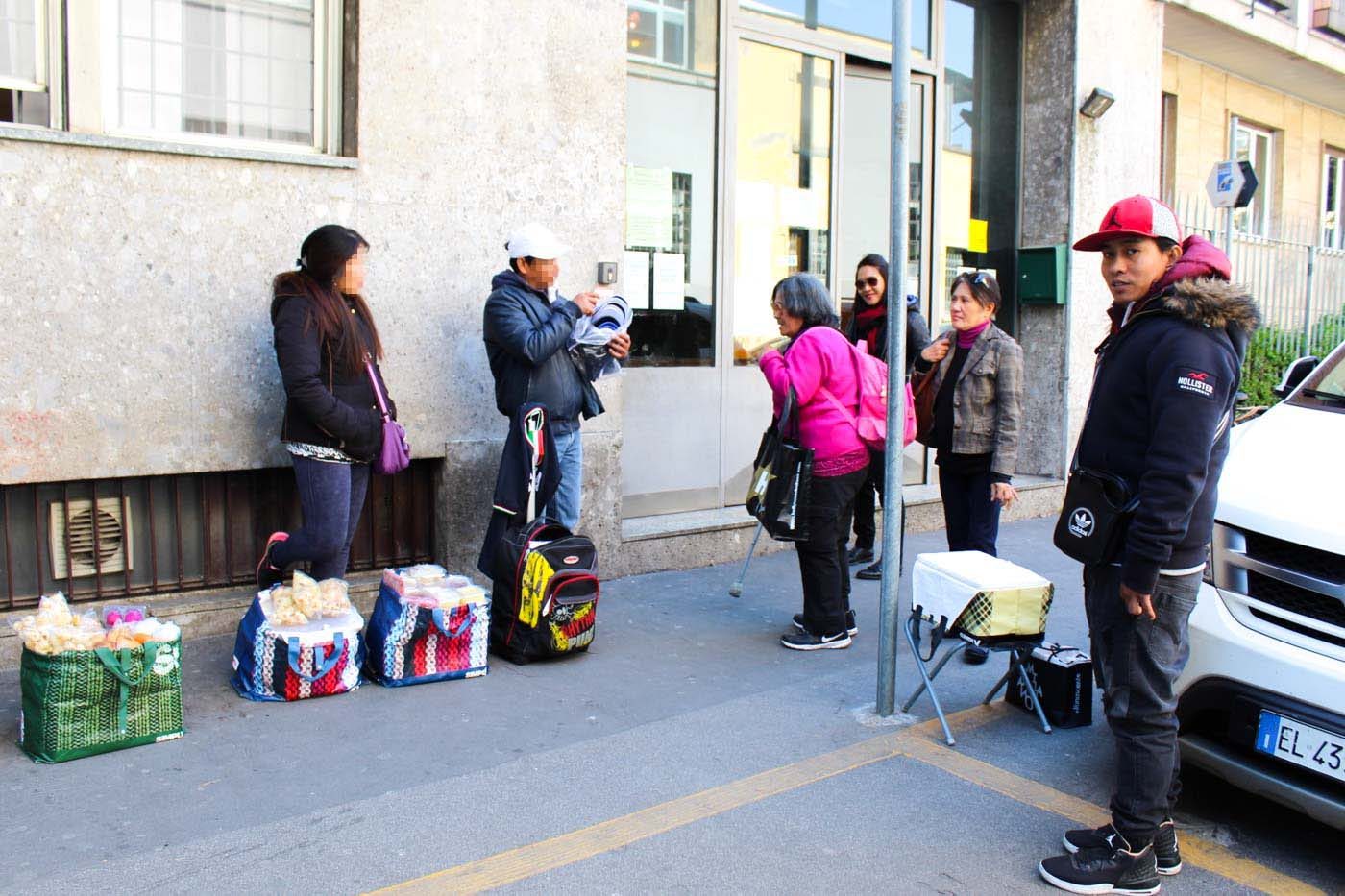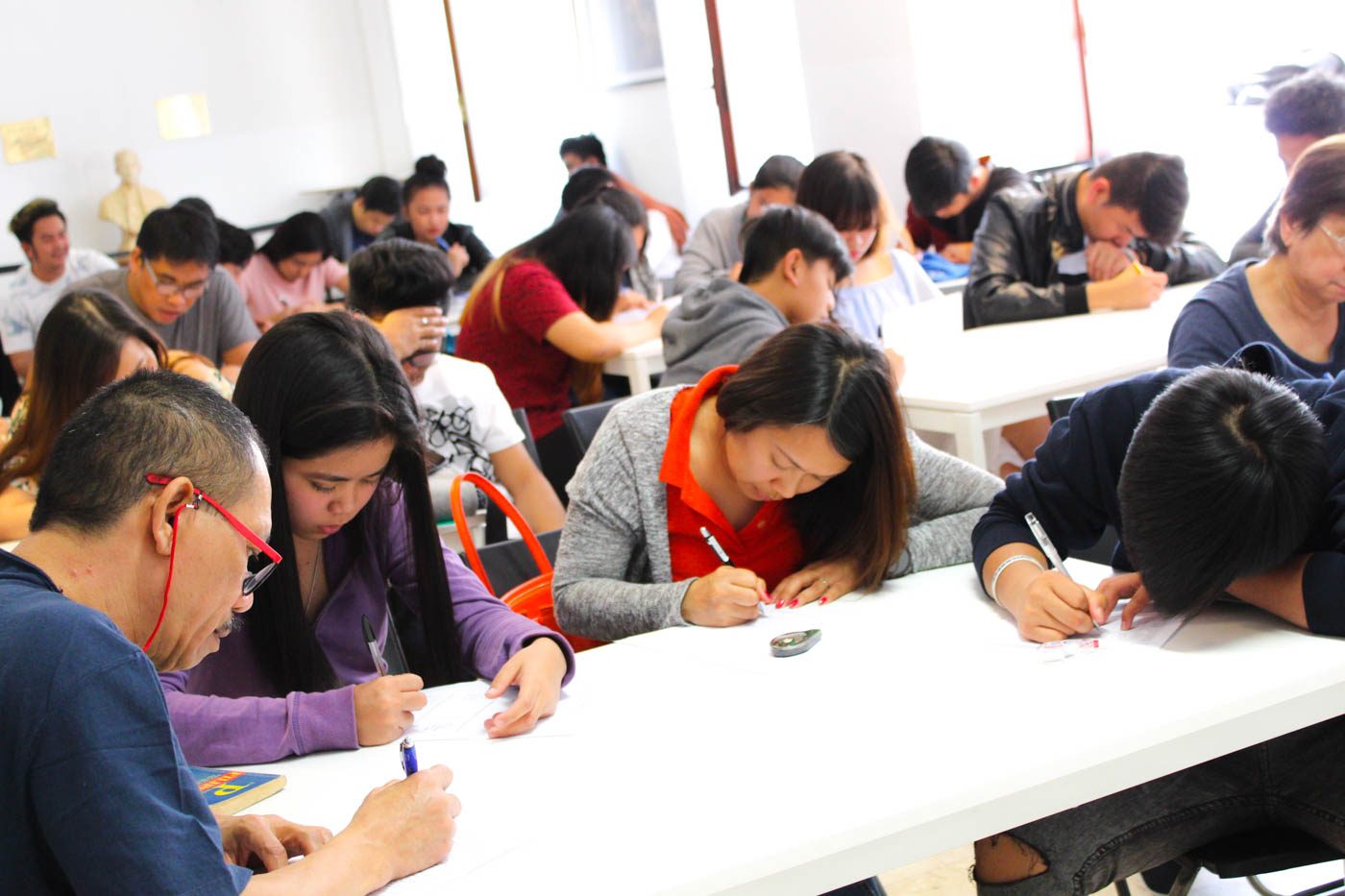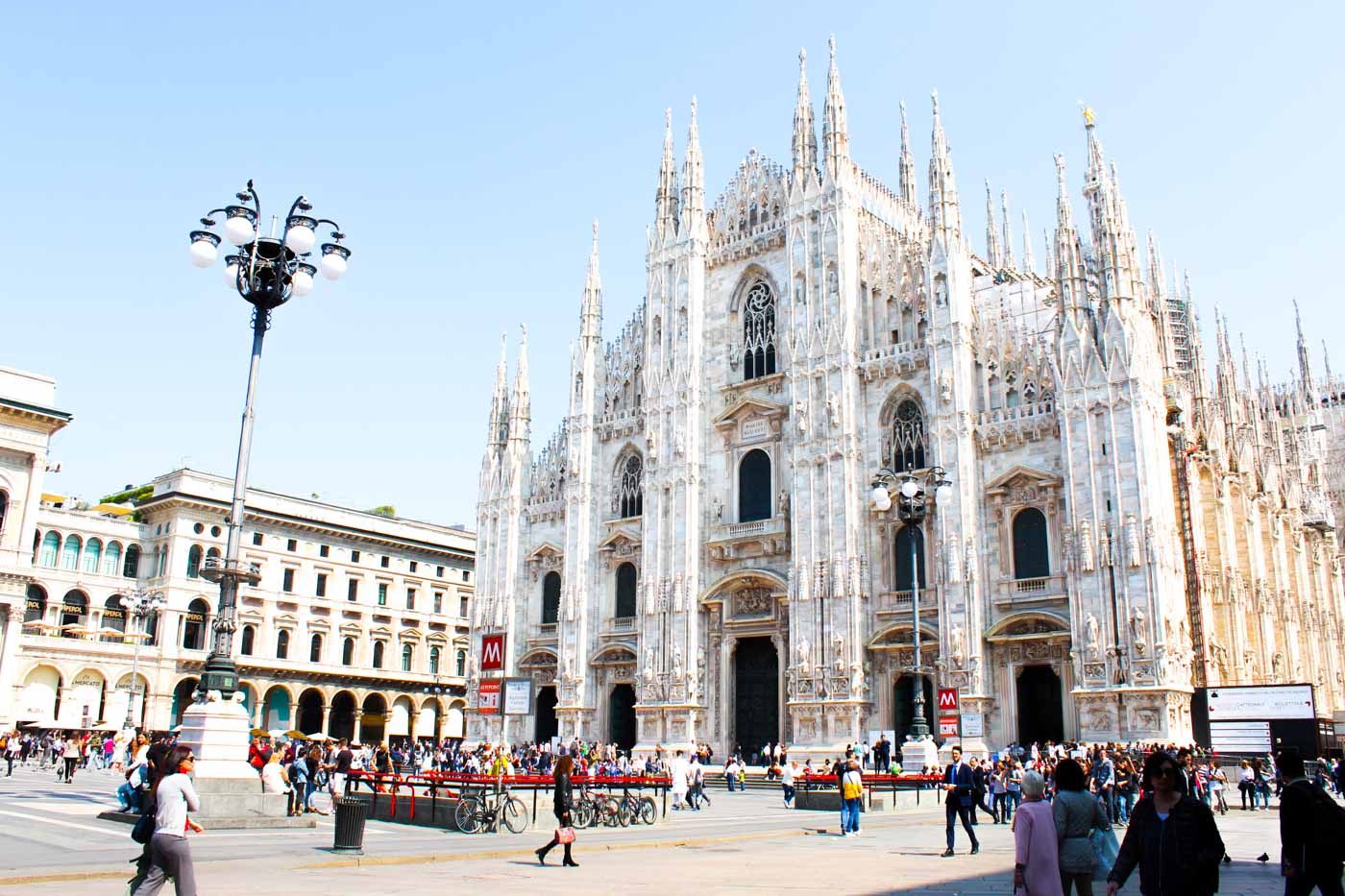SUMMARY
This is AI generated summarization, which may have errors. For context, always refer to the full article.

MILAN, Italy – The first time I met Junjun Paran, he was a driver.
He brought me from the airport to my mom’s apartment when I came to visit her here. We paid him 35 euros for the trip – so much cheaper than what we would have shelled out for a taxi ride. As a first-timer here, being welcomed by a kababayan helped make the trip feel a lot less intimidating.
On my second day I saw him again, this time he was selling Filipino food in front of the Philippine Consulate. Filipinos who visit the consulate stop by to check his goods for a taste of home – kakanin (rice cakes), longganisa (sausage), tocino, among others.
But these are just some of his many “rakets” (livelihood), as I learned when I talked to him. He also regularly works as a cleaner for different offices and offers coach services for organized tours for overseas Filipino workers (OFWs) in Milan, commonly called ‘palakad.’
Working multiple jobs, he says, is the reality for many OFWs in Milan where the cost of living is so much higher than in Manila.
Despite this, Junjun says he would still choose the life of a Milan OFW over working in Manila anytime. This life has always been what he wanted.
Moving to Milan
Junjun’s father has been in Milan for 26 years. With his help, Junjun and his siblings were able to migrate too.
Filipinos are some of the oldest migrant communities in Italy, thanks mostly to the good relationship between the Philippines and Italy. According to a community report released by the Italian government, there are 169,046 documented Filipinos living in Italy, the largest non-EU community in the country.
Many among the first wave of Filipino migrants in Milan entered with tourist permits but were eventually granted amnesty by the Italian government.
Now, according to a community report by the Italian government, 70% of those being granted permit to enter Milan are relatives of those who were already granted a residenza or resident status in Italy. The Italian government allows this in recognition of the importance of family reunification.
After becoming an official resident himself, Junjun was finally able to take his wife and two children here with him. He worked multiple jobs for 4 years to make this happen, and now he needs to work even harder to survive.
“Kelangan natin magsakripisyo para sa kinabukasan ng mga anak mo. Sarili ko, di ko na iniisip,” he said. (We need to sacrifice for the future of our children. I don’t think of my own welfare anymore.)

Challenging times
As is the case for many other OFWs, there’s one thing that lured Junjun and his family to Milan: availability of jobs.
According to the Italian government’s 2015 report, out of 100 Filipino immigrants of working age (18-64 years old), 80 are employed, 6 are inactive but are looking for a job, and 14 are not actively seeking employment.
“Professional specialization has to an extent protected the Philippine community from the worst effects of the economic crisis we are going through,” the report said, adding that ”[In the family services sector] the rate of unemployment within the [Filipino] community is considerably less than that for the set of all non-EU citizens.”
There’s a high concentration of Filipino workers in the service industry. The same report said that 72,000 OFWs in Italy engaged in domestic work in 2014 – that’s about 64% of all Philippine workers and 15.6% of all non-EU domestic workers in the country.
Compared to other non-EU workers in Italy, the report said that Filipino workers have a slightly higher education level: Half possess at least an upper secondary education qualification and one in 10 went through higher education.
Junjun himself got a college degree from the Lyceum of Batangas. It is normal, he says, to find Filipino college graduates working as domestic helpers in Milan. “Kasi sa atin naman pahirap na pahirap din ang buhay. Kung makatapos ka naman diyan, ang sweldo mo naman ay kakarampot pa din,” he said. (Because in our country, life is hard. Even if you’re a college graduate, your salary is still small.)

Despite this, the average salary for Filipino workers in Italy is slightly lower than other non-EU citizens.
According to the report, only 15.6% of OFWs in Milan earn more than 1,000 euros a month, almost 24% lower than the recorded average salary for all non-EU workers. 30% of Filipino workers fall down to the 501-750 euro per month income bracket.
While it may seem high compared to what they could have earned doing the same job in the Philippines, the cost of living in Milan is also so much higher. An average apartment in Milan, for example, would cost around 500 to 1000 euros a month, depending on the size and location. In Junjun’s case for example, he needs to earn at least 1,500 euros a month for rent and other bills.
But even though the income of Filipino workers is not among the highest, a total of 324 million euros or 7.7% of the total 4 billion euros remittances from Italy came from Filipinos in 2014.
Survival of the fittest
Filipinos like Junjun are able to survive the high cost of living by taking multiple jobs and tapping other sources of income, no matter the risks involved.
“Dito naman sa bansang ito kasi, madiskarte ka lang mabubuhay ka na, gumawa ka lang ng paraan, basta sa marangal, mabubuhay ka,” he said. (In this country, if you’re resourceful then you will survive. Just find a way and you will live.)
When he’s not working on his van-for-hire business, Junjun sells Filipino food in front of the consulate office.
Selling on the streets of Milan, without paying required taxes and the proper permit, is illegal and Junjun admitted that he has already been caught by the police several times. When caught, the police confiscate their merchandise and give them a violation ticket.
There’s a 3,000 euro penalty for selling without a proper permit, but they were never really forced to pay. “Panakot lang siguro yan ng mga pulis,” he said. “Ano bang gusto nila, magnakaw kami? Ay syempre iligal man sa batas ng Italia para samin marangal, ‘di ba?” (I think the police are just trying to scare us. What do they want, for us to steal? It may be illegal according to the law in Italy but it’s an honorable job for us.)
Many Filipinos in Milan also face different work hazards.
According to the report from the Italian government, the Filipino community ranked 18th in terms of industrial accidents among non-EU residents in 2014. In 2013, a total of 1,203 OFWs were involved in accidents at work.
The Milan life
Filipinos in Milan, Junjun says, are pretty tight. Just walk around around the Duomo (Cathedral) and you will find OFWs hanging out on their days off.
The Filipino community has also established several organizations among themselves, mostly aiming to help each other in times of need. A group of pensioned OFWs that I’ve met, for example, hosts regular ‘Balikatan’ sessions where they help feed less fortunate Filipinos.

Junjun says it’s important to build a strong relationship with other Filipinos in Milan in order to survive.
“Makisama ka, kahit hindi mo ka ano ano, dahil minsan kung sino pa yung hindi mo kamag anak siya pa yung makakatulong sa’yo habang andito,” he said. (Be friendly, even with those who are not related to you, because sometimes it’s even ones who aren’t your relatives who’ll end up helping you out.)
But sometimes, there are conflicts among Filipinos too, he says. “Alam mo naman ang ugaling Pilipino, lahat makikita mo. Parang satin may mataas, lalo na yung ibang nakapangasawa ng Italyano, talagang mamatahin ka, lalo na kaming mga nagtitinda,” he shared. (You know how Filipinos are, you notice everything. There are those on high horses, especially those who married Italians, who would stare you down, especially vendors.)
The moment he became an OFW, Junjun says friends in the Philippines started treating him differently. “Ang tingin sa’yo mayaman na. Kung alam niyo lang ang buhay namin dito.” (They think you’re rich. If only they knew how life is like here.)
Often, his friends would ask for help in getting to Italy too. “Sinasabi ko na lang sa kanila na pagbutihan niyo na lang diyan kasi kung papangarapin niyo ngayon dito, hindi na tulad ng una na nung una na madaming trabaho,” he said. “Marami nang kakompetensya – mga Chinese, Bangladeshi.” (I tell them to just do well in the Philippines because Italy doesn’t have that many jobs for migrants like it used to. We have lots of competition now – the Chinese, Bangladeshi, etc.)
Junjun himself doesn’t want to live in Milan forever. His goal is to be able to come back with his family by the time he turns 50. “Target naming yung makaipon para makapagpundar ng pangnegosyo bago umuwi,” he said. (Our target is to save up for a business before heading home.)
But going back is still far behind his priorities. For now, Junjun has his eyes set on taking care of his family and giving his children the capacity to follow their dreams, a luxury many other Filipino children do not have. – Rappler.com
Add a comment
How does this make you feel?
There are no comments yet. Add your comment to start the conversation.